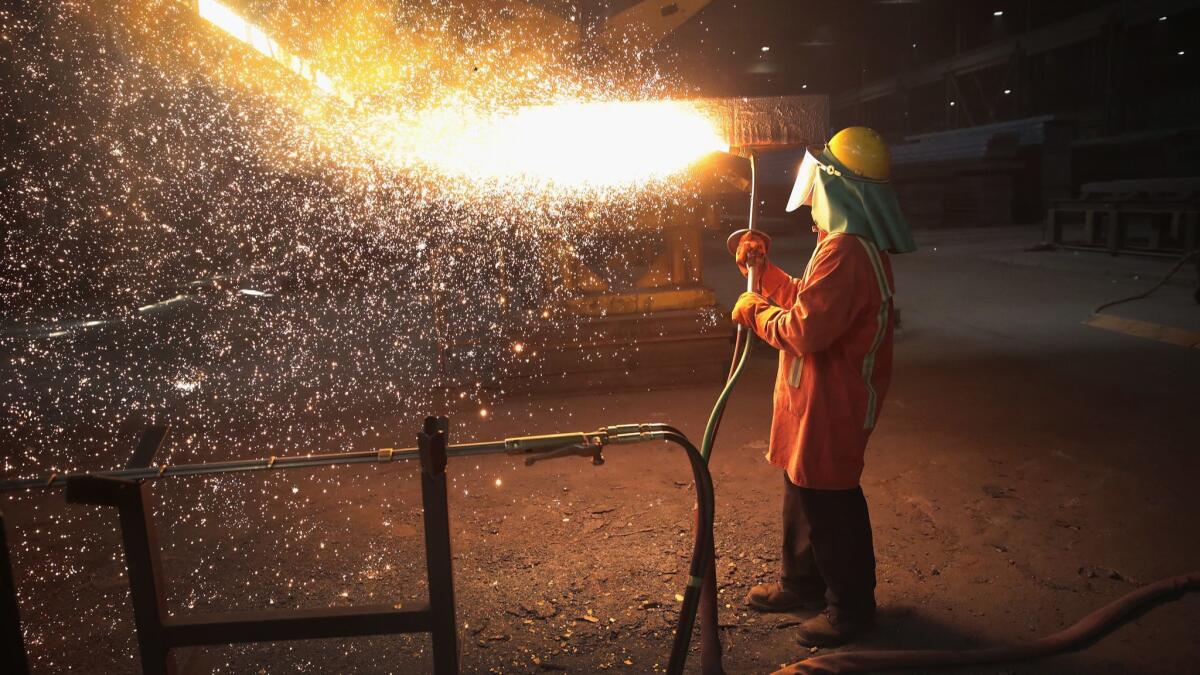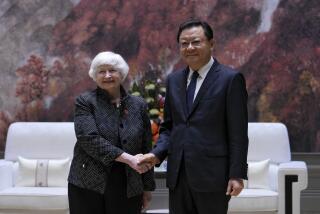Trump’s trade war boomerangs to hit steelmakers as prices and profits sag

The trade war that President Trump started with China to protect domestic companies is starting to bite the industry he championed in his “America first” campaign.
Since the Trump administration announced tariffs last year, domestic steelmakers’ shares have slumped, partly on concern that trade tensions with China threatened global economic growth and demand for steel. Now, there’s evidence that those fears are being borne out, with U.S. Steel Corp., Nucor Corp. and Steel Dynamics Inc. all issuing warnings this week about third-quarter profits.
The producers are reeling from a manufacturing slump that has hurt its customers’ ability to take on higher prices. A key U.S. factory gauge unexpectedly contracted in August for the first time since 2016, adding to evidence of global manufacturing woes, and on Thursday the international Organization for Economic Cooperation and Development lowered its global growth forecast as protectionist policies take an increasing toll on confidence and investment.
“All of these trade battles that are going on are creating uncertainty for everyone at every level, all the way from the manufacturer down to the end consumer,” Randy Frederick, a vice president of trading and derivatives who helps oversee $3.7 trillion in assets at Charles Schwab in Austin, Texas, said in a telephone interview. “And uncertainty always breeds complacency, which ultimately is going to stifle demand for things like steel.”
U.S. Steel shares headed for the biggest loss in more than a year on Thursday after the company said it expects to report a wider loss than analysts were expecting. The Pittsburgh-based producer cited weakening markets for flat-rolled steel and tubular products for the energy industry. That warning came two days after Nucor, the largest U.S. producer, said third-quarter profit has waned amid “some softening in automotive, agricultural products and power transmission markets.”
Adding to the travails is that steelmakers boosted production plans in the wake of the tariffs, which put self-inflicted pressure on prices. Ebbing demand from industrial customers and prospects for increased output are upending the optimistic outlook conveyed by the top executives of steel companies as recently as midyear. In July, John Ferriola, the chief executive of Charlotte, N.C.-based Nucor, declared that steel prices had hit bottom, citing strong demand in key end-use markets.
The Institute for Supply Management’s purchasing managers index fell to 49.1 in August, weaker than all forecasts in a Bloomberg survey of economists, according to a report earlier this month. Figures below 50 indicate the manufacturing economy is generally shrinking. Factory weakness has sparked worries over the possibility of a broader U.S. recession.
“We know that there are concerns about a recession in the U.S.,” said Frederick of Charles Schwab. “A lot of it has to do with the trade concerns in China and a general slowdown overall in manufacturing.”
The impact of the trade war on the U.S. economy hasn’t escaped the notice of Federal Reserve policymakers.
“Business investment and exports have weakened amid falling manufacturing output,” Fed Chairman Jerome H. Powell said Wednesday. “The main reasons appear to be slower growth abroad and trade policy developments, two sources of uncertainty that we’ve been monitoring all year.”
U.S. Steel shares fell 11% at 11:59 a.m. Eastern time on Thursday, heading for the biggest intraday drop since April 2018. The stock has declined by about 40% this year. The S&P Supercomposite Steel Index of 13 producers has dropped 28% since the tariffs were announced in early March of last year.
“The macroeconomic outlook has not been friendly to the steelmakers this year,” Tyler Kenyon, an analyst at Cowen in New York, said in a telephone interview. “Some of that could be associated with trade tensions and uncertainty globally, and softness in the global industrial economy. It’s certainly changed the landscape for the steelmakers and their customers.”





